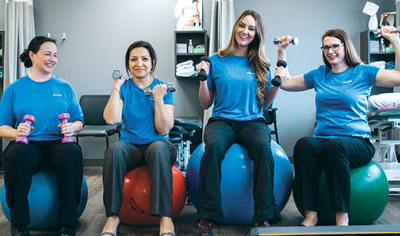Address:
Phone: 416-922-5118
Fax: 647-436-1926
Hours of operation
- Mon:11:00am-7:00pm
- Tue:9:00am-5:00pm
- Wed:11:00am-7:00pm
- Thu:9:00am-5:00pm
- Fri:8:00am-4:00pm
- Sat:Closed
- Sun:Closed
There are 2 parking spaces available at the back of our building, identified with our clinic signage - the laneway is accessed from Walker Ave or Woodlawn Ave.
There is street parking available on side streets, and on Yonge St (free or paid parking, depending on which street/time of day).
We are across the street from the Summerhill subway station (a 2 min walk), and the clinic suite is accessible by elevator.
Clinic information
Clinic information
Manual Lymphatic Drainage
Pre/Post Natal Care
Temporomandibular Joint Rehabilitation
Visceral Massage
Functional Dry Needling
Work Conditioning/Hardening
Yoga Therapy
Myofascial Release Therapy
Osteopathy

Join our team
Apply nowOur team
Our team
-
PhysiotherapistType Physiotherapist Book onlineLanguages: English
-
PhysiotherapistType Physiotherapist Book onlineLanguages: English
-
PhysiotherapistType Physiotherapist Book onlineLanguages: English
-
ChiropractorType ChiropractorLanguages: English
-
PhysiotherapistType PhysiotherapistLanguages: English
-
Massage TherapistType Massage Therapist Book onlineLanguages: English, Farsi
-
Osteopathic PractitionerType Massage Therapist Book onlineLanguages: English
-
 Type Osteopath
Book online
Languages: English
Type Osteopath
Book online
Languages: English
Common conditions we treat
Common conditions we treat
-
Carpal tunnel syndrome
Carpal tunnel syndrome is caused by pressure on the median nerve in the wrist and can result in numbness, tingling and pain in the affected hand and arm. It is often the result of repetitive use and strain. Physiotherapy can help alleviate some of the symptoms associated with carpal tunnel syndrome.
-
Headaches
Headaches can be caused by a variety of conditions and once assessed by a healthcare professional can be helped with physiotherapy treatment.
-
Knee pain
Knee pain can be caused by bursitis, a torn tendon, ACL tear or injury and overuse. It is most frequently the result of osteoarthritis. Physiotherapy can help speed recovery.
-
Low back pain
Low back pain is one of the most common patient complaints. It can result from arthritis, spinal stenosis, scoliosis, sciatica, injury or overuse. An assessment from a physiotherapist or chiropractor can help provide a diagnosis and treatment plan.
-
Muscle sprains and strain
Muscles sprains and strains can result from sport or motor vehicle injuries, overuse or common activity. They can range to mild, moderate to severe requiring more intensive intervention. Physiotherapy and massage therapy can help speed recovery.
-
Neck pain
Neck pain can result from poor posture, injury like whiplash, infection in the lymph nodes or throat, or a herniated disc. Physiotherapy, massage therapy or chiropractic treatment can help improve mobility and pain.
-
Pelvic floor tension
Pelvic floor tension or dysfunction, specifically muscles that are too tight. The pelvic floor muscles are the group of muscles that attach to the front, back and sides of the bottom of the pelvis and sacrum. When the muscles are too tight it can cause pelvic pain, challenges with continence and intercourse (for women). An assessment from a pelvic health physiotherapist can help diagnose and treat the condition.
-
Plantar fasciitis
Plantar fasciitis is one of the most common causes of heel pain. Plantar fasciitis commonly causes stabbing pain, usually occurring with the first steps in the morning. With activity, pain typically subsides, but can return after running or standing up after sitting for a length of time. It most commonly affects people who stand for long periods on hard surfaces, runners, and other high-impact athletes. Treatment from one of our foot care specialists may help to reduce the symptoms and pain.
-
Post-surgery
Complications following surgery can include pain, limited mobility, numbness and emotional issues. An assessment from a qualified physiotherapy along with a detailed treatment plan can help to alleviate post-surgery challenges.
-
Sciatica
The sciatic nerve run from the lower back, through the hip and into each buttock before traveling down each leg. Sciatica is the term used to describe the symptoms when there is pressure on the nerve, causing pain in the lower back, hip or buttock. Physiotherapy or chiropractic services can help relieve sciatic pain.
-
Shoulder pain
Shoulder pain can result from bursitis, frozen shoulder, tendonitis or injury and overuse. On rare occasions it may be triggered by illness or infection. A holistic treatment plan that may include physiotherapy, acupuncture, massage therapy or chiropractic services may help.
-
Sports injuries
Sport injuries can occur in weekend warriors to professional athletes, ranging from minor to acute. A treatment plan from physiotherapists and sport medicine physicians can help speed recovery and prevent future injury.
-
TMJ
Temporomandibular joint dysfunction or TMJ refers to pain and dysfunction of jaw muscles and the joints that connect the jaw bone to the skull. It is characterized by pain, difficulty chewing and noises (popping/cracking) when the jaw moves. Physiotherapy or massage therapy may help alleviate some of the symptoms of pain and discomfort.
-
Urinary incontinence
Urinary incontinence, or UI is any involuntary loss of urine, whether that be a little or a lot. It is believed that nearly 1.5 million Canadians, of all ages, suffer from some form of UI. The two most common forms of UI are stress incontinence and urge incontinence. Pelvic health physiotherapists are trained to assess and treat all forms of UI.
















